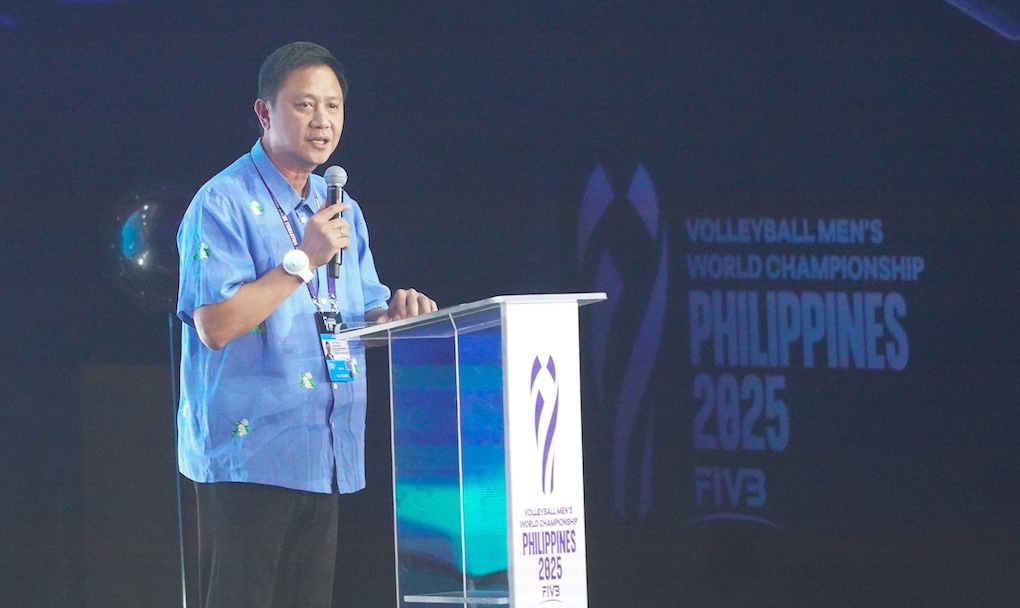Philippine Sports Commission chairman Patrick Gregorio yesterday reiterated the importance of sports tourism as the country aims to position itself as a major global sporting destination.
“The biggest tourism events are sports events,” said Gregorio as the Philippines is in the thick of hosting the 32-nation FIVB Volleyball Men’s Championship at the Smart Araneta Coliseum and MOA Arena.
The event drew the top volleyball nations led by world No. 1 Poland followed by Italy, Brazil, France and the United States. It comes two years after the Philippines successfully co-hosted the FIBA World Cup with Indonesia and Japan.
In November, the Philippines will also play host to the 3rd FIG Artistic Gymnastics Junior World Championships and the FIFA Futsal Women’s World Cup.
Alas Pilipinas, the national team, is giving it all against the sport’s best. The Nationals, ranked 88th in the world world, bowed to Tunisia on opening day then pulled off a magical four-set win against Egypt, ranked No. 21, last Tuesday.
Alas Pilipinas, the underdog, did the unthinkable by beating the Egyptians before a roaring homecrowd and kept its hopes alive of advancing to the next round.
Gregorio said it was a proud moment for Philippine volleyball, especially the men’s team, and it came amid criticism regarding the cost of hosting the 32-nation event.
“This win is for those who believed that we can. It’s a gift for those who came, those who cheered from their homes and those who continue to support our national team and Philippine sports,” said Gregorio.
The PSC chief said these are rare opportunities for the country to showcase its readiness and ability to host world-class sporting events.
Volleyball alone has a global fan base of 631 million spread across 80 different markets, a testament to the sport’s popularity that extends around the globe.
“The benefits of hosting world-class sporting events are far greater than the cost,” said Gregorio, citing the economic impact and media value generated by such events before an international audience.
“It is an economic investment, not an entertainment showcase only for local markets. The world is watching this, not just those in the stands.”
As PSC chairman, Gregorio is leaving no stone unturned, pushing for the advancement of a tourism inter-agency council, in strong collaboration with the Department of Tourism under Secretary Christina Garcia Frasco.
It aims to boost and develop sports tourism in the country by strengthening the two agencies’ hosting efforts and the alignment of their resources and strategies in line with President Marcos’ overall program.
The funds to be utilized in the program will be drawn exclusively from the budget allocated for sports, ensuring that no other budget lines outside of sports will be affected.
“There is such a universe of benefits that can be had from actively bidding for these global sporting events, and we’ve seen robust interest on the part of our tourism stakeholders so much so that, with just a phone call, they formed a tourism consortium to craft packages specifically designed for each event,” said Frasco.
According to a Nielsen Sports report, hosting major international sporting events significantly enhances visitors’ perceptions of the host city, encouraging repeat visits and positive word-of-mouth recommendations.
During the 2023 FIBA World Cup held in Manila, a survey of 1,276 non-resident attendees revealed compelling insights—90 percent said the event added to the city’s appeal and 82 percent felt it strengthened Manila’s reputation as a cosmopolitan destination.
Roughly 79 percent reported an improved overall impression of the city, 69 percent were inspired to consider Manila for a holiday or weekend getaway, 70 percent would recommend visiting the city to friends and family and 77 percent expressed a strong likelihood of returning.
These findings underscore the transformative power of global sports events in elevating Manila’s profile on the international stage and driving tourism growth.
“The yield is what we’re after – long-staying, repeat, and higher-spending visitors. The economic impact on the industry is so much better,” added Frasco.
Gregorio said for the FIVB event, each delegation can reach up to 40 persons, and others if not most of them flew in with family members, friends and even supporters. There are 80 members of the foreign press in town covering the event.
“We are here to promote sports tourism,” said the PSC Chairman.
Global sporting events serve as powerful catalysts, not only energizing the sports and tourism sectors, but also driving growth across affiliated industries such as retail, hospitality, travel, and food services, among others.
By elevating the Philippines' profile on the international stage, these events unlock broader economic opportunities and create ripple effects that benefit a wide range of communities and industries.

